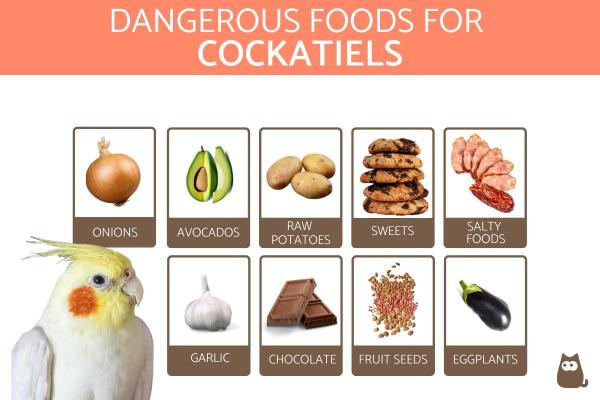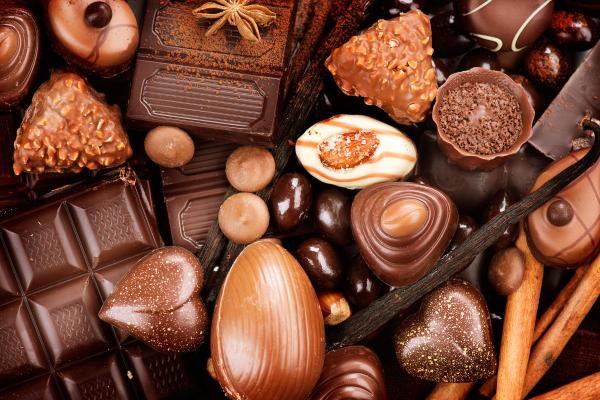
Cockatiels (Nymphicus hollandicus), also known as the weero/weiro, are delightful granivorous birds with an appetite for a diverse range of foods. To ensure their optimal health and well-being, it's essential to provide cockatiels with a balanced and varied diet that includes feeds, fruits, vegetables, seeds, nuts, legumes, sprouts, and more. However, certain foods can be toxic or harmful to these birds and should never be incorporated into their diet.
In this AnimalWised article, we will reveal the essential list of prohibited foods for cockatiels.
Avocado
Avocado contains a compound called persin, which is harmless to humans but highly toxic to many other species. Among these species, birds are particularly vulnerable to persin poisoning due to their heightened sensitivity.
Persin acts as a cardiotoxic substance, capable of damaging the heart muscles. Consumption of persin can lead to various symptoms, including increased heart rate, difficulty breathing, body-wide congestion, hydropericardium (fluid buildup around the heart), and anasarca (generalized edema).
The severity of the poisoning depends on the amount of avocado ingested by the bird, with serious conditions often arising. In cases of high doses, an acute respiratory syndrome can occur, leading to fatality within a short period of 12-24 hours.
You might be interested in this other article, where we discuss the best diet for parrots.
Garlic and onion
The toxicity of onion and garlic in dogs and cats is well-known, but it's important to note that these foods can also have harmful effects on other animals.
Birds, in particular, are sensitive to the alkaloids present in onion and garlic. Consuming these foods can lead to anemia and other blood disorders, which manifest through symptoms such as weakness, lethargy, pale mucous membranes, and, in severe cases, coma and even death.
While the toxic dose for birds has not been specifically determined, it is strongly advised to exclude onion and garlic from their diet as a precautionary measure.
[ltmbox id="EmdpAwmw" label="Click Here to Buy Bird Toys"]
Sugary foods
While sugar itself is not considered toxic to cockatiels, it is not beneficial for them either. Foods high in sugar, such as pastries, candies, sweets, soft drinks, juices, and honey, can contribute to obesity and the development of endocrine diseases like diabetes mellitus. Consequently, foods rich in sugar should not be a regular part of your cockatiel's diet.
Foods that are high in carbohydrates, including bread, pasta, rice, and legumes, should also not be a staple in their diet. However, they can be offered occasionally, with a maximum frequency of once a week.
When incorporating bread into the diet of cockatiel, it's important to offer it in small quantities, typically around 3–5 grams per nymph. Additionally, it is advisable to opt for unsalted whole meal bread whenever possible.
Foods with xylitol
Xylitol, a common sweetener found in "sugar-free" products and chewing gum, poses a significant risk of poisoning to our pets. While it is harmless to humans, it has been associated with numerous cases of poisoning in dogs and cats. Surprisingly, birds are also sensitive to the effects of xylitol.
When ingested, xylitol triggers the release of insulin, leading to a rapid decrease in blood glucose levels. This can result in symptoms such as depression, weakness, lack of coordination (ataxia), seizures, and ultimately, death. Furthermore, xylitol has the potential to cause liver damage.
Given the dangers associated with xylitol, it is crucial to prevent birds and other pets from accessing products containing this sweetener. It is best to keep such items securely stored and out of their reach to ensure their safety.
Don't forget to check out this informative article where we discuss the primary distinctions between female and male cockatiels.
Salty foods
Salt is an essential component of bird diets, providing them with vital minerals such as sodium and chlorine. However, it's crucial to maintain an appropriate balance of salt in their diet, as an excessive concentration can lead to salt poisoning in birds. This condition can have serious health implications, including diarrhea, dehydration, neurological disorders, hypertension, and even kidney failure.
In severe cases, salt poisoning can be fatal for affected birds, underscoring the importance of keeping foods rich in salt out of their reach.
Examples of such foods to avoid feeding pet birds, including cockatiels, include pickles, sausages, salted nuts, and similar items. By taking this preventive measure, you can ensure the well-being of your feathered companions and minimize the risk of salt-related health complications.
Chocolate
Chocolate contains methylxanthines, namely caffeine and theobromine, both of which can be toxic to animals. Ingestion of chocolate by pets can lead to a poisoning condition characterized by various symptoms, including hyperactivity, vomiting, diarrhea, arrhythmia, convulsions, and, in severe cases, even death.
It's important to note that the concentration of these toxins is higher in purer forms of chocolate, making the resulting intoxication more severe. Therefore, the type and amount of chocolate consumed by an animal play a significant role in determining the potential harm caused by chocolate poisoning.
Be sure not to miss this fascinating article, where we delve into the intriguing question of whether cockatiels have the ability to talk like parrots. It explores the communication abilities of cockatiels and provides insights into their potential for mimicry and vocalization.

Fruit pits or seeds
To ensure the cockatiels maintain a healthy diet, it is essential to incorporate fruits due to their rich content of vitamins and minerals. Including fruits also adds variety to their food intake.
However, it is crucial to be aware of the potential dangers associated with the bones or seeds of certain fruits. These components contain a compound called amygdalin, which can convert into cyanide—a substance that can be lethal for these animals.
It is advisable to avoid feeding cockatiels with fruits that possess amygdalin in their bones or seeds. Some examples of such fruits include:
- Peaches
- Apricots
- Apples
- Pears
- Cherries
Nonetheless, it is worth noting that the flesh or pulp of these fruits is free from this harmful compound, making them safe to include in their diet.
Raw potato
Raw potatoes should be avoided as part of the cockatiel's diet due to the presence of solanine, a toxic alkaloid. Solanine acts by inhibiting the activity of the enzyme acetylcholinesterase, resulting in symptoms of intoxication such as diarrhea, anemia, weakness, and loss of appetite.
Nevertheless, it's crucial to understand that solanine is sensitive to heat and water. When potatoes are cooked, this compound breaks down and becomes soluble in water.
As a result, if you wish to include potatoes in the cockatiel' diet, it is safe to do so as long as you provide them cooked potatoes. Cooking effectively eliminates the solanine, making the potatoes suitable for consumption without posing a risk to the cockatiel' health.
You may find this article intriguing, as it offers insights into understanding your cockatiel's behavior and expressions.
Eggplant
To ensure the well-being of cockatiels, it is important to avoid feeding them eggplant. Like potatoes, eggplants contain the toxic alkaloid solanine, which can have detrimental effects on their health.
Furthermore, eggplants also contain oxalates, which can increase the risk of urinary stones and kidney issues. Consequently, it is recommended to refrain from including eggplant in the diet of cockatiels.
If you want to read similar articles to Forbidden Foods for Cockatiels, we recommend you visit our Healthy diets category.
- Martorell, J. (2009). Poisoning in birds. clin. vet. small Anim. 29(3)172-178